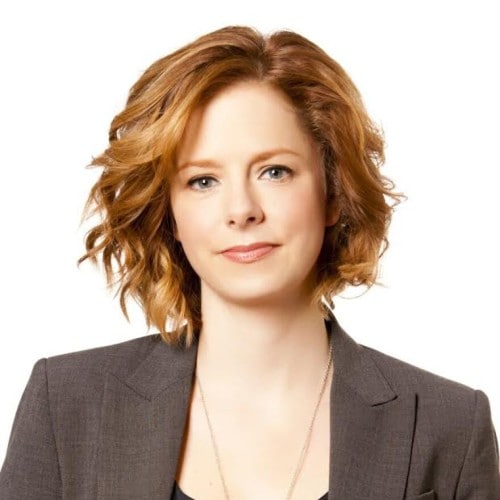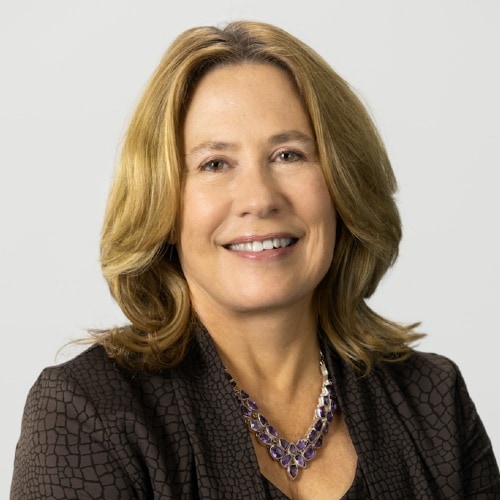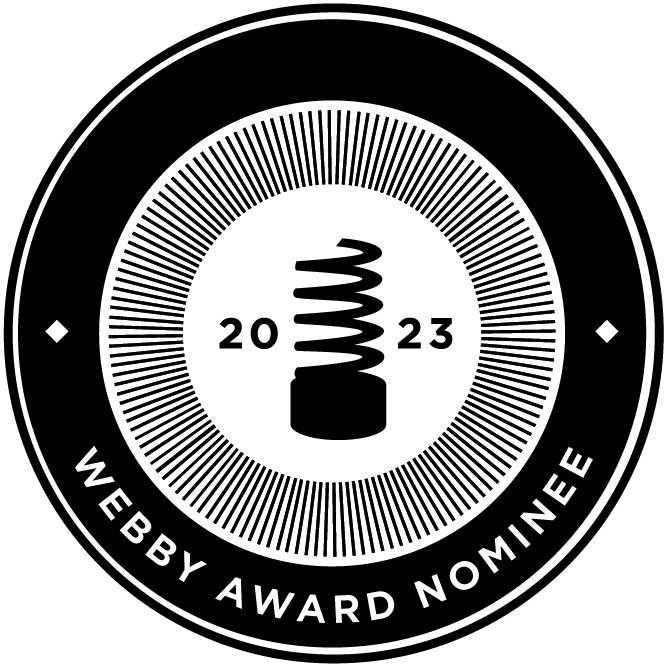{{item.title}}
{{item.text}}

{{item.text}}
Take on Tomorrow, the award-winning podcast from our management publication strategy+business, brings you Episode 4: “Will crypto revolutionize the financial system?”
There’s an old saying: people overestimate the impact of technology in the short term and underestimate it in the long term. Is that what’s happening with crypto? There’s a lot of news about cryptocurrencies, but are we paying too little attention to the long-term impacts of the underlying technology? In this episode, we’ll hear how blockchain, and the cryptocurrencies that exist because of it, could affect financial systems and transform business and society—ready or not.
Lizzie O’Leary
Podcaster and journalist
Ayesha Hazarika
Columnist and former senior political advisor
Sheila Bair
Former Chair
US Federal Deposit Insurance Corporation (FDIC)
Vicki Huff Eckert
Retired Partner, PwC US
Former Vice Chair for PwC's US TMT Sector
2023 Shorty award winner for "Best Branded Podcast" series
2023 Webby award nominee for "Best Podcast" series
{{item.text}}

{{item.text}}
As reinvention pressure rises, CEOs need to rewire their decision-making.
Sharp, actionable insights curated to help global leaders build trust and deliver sustained outcomes. Explore our latest content on the global issues affecting organisations today from ESG to value creation, technology and cyber to workforce transformation.
Vicki Huff Eckert: What is starting to emerge is Web 3.0, and 3.0 is the next generation of the internet. It’s really, really early days. And the computer science that Web 3.0 is built on is blockchain, and it’s blockchain networks.
Sheila Bair: There’s a difference between free markets and free-for-all markets, as we used to say at the New York Stock Exchange. And it is true.
Vicki: That is why I actually am encouraging industry leaders to spend time and educate themselves on it. Because it will, it will grow with Gen Z, right? And they’re graduating college, and here they come.
Ayesha Hazarika: From PwC’s management publication strategy and business, this is Take on Tomorrow, the podcast that brings together experts from around the globe to figure out what business could and should be doing to tackle some of the biggest issues facing the world.
I’m Ayesha Hazarika, a broadcaster and former senior political advisor in London.
Lizzie O’Leary: And I’m Lizzie O’Leary, a podcaster and journalist in New York. We are living through a revolution in the way people think about money. At the center of that revolution are digital currencies. But what you think you know—the names of some of these famous assets, like bitcoin, or whatever—that’s not exactly what people in the industry think about. They’re thinking about how the infrastructure of all of this is going to change how money flows.
Ayesha: So, today on the show, we’re going to start with a wee crash course. Call it Blockchain Technology 101: The Future of Money and What It Means for You. That’s coming up on Take on Tomorrow.
Lizzie: Oh, and by the way, Take on Tomorrow is a place for us to discuss the future. It is definitely not financial or legal advice.
Ayesha: Or tax advice. None of that.
Lizzie: In just a bit, we’ll be joined by Sheila Bair. Sheila was at the highest levels of the US government during the 2008 financial crisis. She led the Federal Deposit Insurance Corporation—the FDIC—which is the government agency that insures Americans’ bank deposits. Today, she not only sits on the board of Paxos, a major blockchain technology company, but she’s also the author of children’s books about responsible money management. We are going to talk to her about what regulating this digital Wild West could look like. But first we are joined by Vicki Huff Eckert. Hello, Vicki.
Vicki: Hello, ladies. It’s great to be here today.
Ayesha: Now, Vicki, you’re recently retired from PwC US, where you were vice chairwoman responsible for services to the technology, media, and telecommunications sector.
Ayesha: Obviously, this stuff—crypto, blockchain, NFTs—can be very confusing and, indeed, a bit overwhelming for people. So, given your expertise, we thought we’d start off with some basics. Let’s start with the simplest of terms. What is blockchain?
Vicki: Blockchain is a technology that’s decentralized. And what it does is record-keeping over a number of computers across a network that’s on a chain. So think of it as one transaction being recorded many times. And it results in an immutable copy. That is the concept of the decentralized computing.
Ayesha: Why is blockchain important? Why are we all talking about blockchain? How’s it going to impact business and society?
Vicki: Blockchain is really important because it is the network that underlies Web 3.0. So when you think about the first generation of the internet, you think of the Internet Explorer, and if you happen to be my age, you think of Windows 95 and Netscape. And then you had the evolution, with the birth of the iPhone, into 2.0 and applications such as Meta and Google and Apple.
And what is starting to emerge is Web 3.0, and 3.0 is the next generation of the internet. It’s really, really early days. And the computer science that Web 3.0 is built on is blockchain, and it’s blockchain networks.
Ayesha: And so, in terms of looking at those shifts, what are the things we should be looking out for, and where does cryptocurrency fit into all of this?
Vicki: So, if you look at the shifts that are going to come with 3.0, what is important is introducing the concept of ownership and moving data ownership from being in the network to the human.
Ayesha: And so, Vicki, who are the types of people who are doing this, who are buying cryptocurrency and using it right now? And is it expensive?
Vicki: Right. Well, it’s not cheap. But you can buy it fractionally. So you don’t have to buy one bitcoin or one eth, because they are quite expensive. But who is buying it? The trends are being led by what I consider two ends of the spectrum. You have kids and Gen Z folks buying it throughout the world. This is a generation that has stayed home now from school for the last two-plus years. And they are really proliferating this space through gaming and being able to buy their merch on their games, and they use bitcoin and other cryptos to do that.
On the other end, you have very high net–worth individuals that are starting to see the ability to invest. To be very clear for the listeners, it is very speculative. But they are investing in these technologies, and they’re buying on the other end to make their investments. Because, as I mentioned before, everything you do within blockchain networks, the payment is through cryptocurrencies.
Ayesha: So, Vicki, you’re absolutely clear that this shift is happening. This shift is coming?
Vicki: Yeah, I am. I think that’s a great question, because I think that there are a lot of folks, we all have gone through it, wondering when this will pass: is it really here to stay? Not wanting to actually take the time and learn all of these new terms, because they were hoping that it would just go away, and you can move on.
But the reality is these markets are very large. They fluctuate a lot, but it is at a point where it’s pretty clear it’s here to stay. And I think what’s most important is, it really is coded in to these future protocols for the internet. And so, it’s coming at us, and something we all need to now start really taking the time to learn about.
Ayesha: Lizzie, to start learning, you called Sheila Bair, former bank regulator and board member of a blockchain startup. What did you find out?
Lizzie: It’s really interesting to me, because she comes at this from so many different angles. Right now, she sits on the board of a blockchain company that is called Paxos. When I first met Sheila, though, she was running the FDIC. I was a reporter who covered the Treasury Department and ended up covering the financial crisis. It was during some of the scariest days of the financial crisis. And I actually started our interview by asking her about that time.
When I first got to know of you, I knew you as the FDIC chair, and it was the beginning of the financial crisis. I saw a lot of you. I sat on the floor outside of meetings that you were in, but you always seemed to come with a sense of, “What do all these big policy conversations mean for people at the end of the chain who maybe don’t understand what’s going on?”
And you write kids’ books. How would you describe what you do to, to a kid, in the plainest language?
Sheila: Yeah. Well, so I think I explained to children that throughout my career I’ve tried to find jobs where I can help people protect their money, grow their money safely, manage their money well.
So that’s something I derive a lot of satisfaction from. It’s an area where I think I have made a contribution, and continue to make one.
Lizzie: I wonder how you would describe what’s wrong with money and how we think about it, right now.
Sheila: Well, I think, the immediate problem with money, let’s just say traditional money, fiat currency, is that the payment system—the challenge of getting money from point A to point B—is heavily intermediated. So there are middlemen or -women in between, and it’s a particularly bad problem if you’re trying to transfer money from one jurisdiction to another, an international transfer.
Lizzie: Let’s define intermediation, for people who don’t understand the markets well.
Sheila: Intermediation is, let’s say you’re in Europe or in Canada. I’m in the US. If I want to wire money to you, that’s got to go through a couple of different banks. It’s got to go through a US bank. And if it’s a small US bank, it may have to go through another big bank, and it’s got to go through a Canadian bank, and it may have to go through another bank in Canada.
So at each step along the way, you’ve got a bank processing the money I’m trying to get to you and probably charging a fee for it. I do business in Canada. I’m connected to a couple of companies there. Anytime they try to transfer money to me or vice versa, I get these whopping fees, $200 transfers and $30 fee. That’s intermediation.
With a blockchain, I could just transfer it directly to you in Canada. And there would not be any cost. That is a potential for this technology. That’s what I mean by intermediation.
Banks make tons of money off of payments. The clearing houses make tons of money off of clearing and settling securities and derivatives, futures, options, et cetera. And they are threatened by this.
Lizzie: And that must stick with you, given everything that you oversaw when you were at the FDIC.
Sheila: Oh, absolutely. And because of this intermediate system, you need these large dominant institutions that have a reach into Europe and Canada and South America, et cetera, that have the capacity to take millions of payments and process them.
So that’s one of the reasons you need these very large institutions. But maybe we don’t need them. That’s what cryptocurrency is all about.
Lizzie: How did you first get interested in cryptocurrency?
Sheila: I was approached to be on the board of a company called Paxos some time ago. And they had a vision, and still do, to try to get a lot of the frictions that I was mentioning earlier out of the system. Not just in terms of intermediating payments, which is really important at the grassroots level, at the working family level, but also at a macro-system stability level—getting all these frictions, this intermediation and centralized intermediation, out of this system.
That was when I was first exposed to blockchain and the promise of blockchain. And I’m still very bullish on blockchain technology—not so much on some of the assets that are traded on blockchain. Don’t own bitcoin. Don’t own dogecoin. Tell people to stay away from it. You know, there’s a lot of silly stuff out there that people were making a lot of money on, and losing money on, too.
I stay away from that. Because I don’t understand what the real value is behind those assets. But I do believe in the technology a lot, and I think the best is yet to come in terms of deploying those technologies to help people at the household level.
Lizzie: You are articulating a need for faster payments, ease of financial transaction, without a lot of clogging up the wheels for regular people.
But then at the same time, I think that cryptocurrency is often thought of as not for regular people—that these are assets with huge value swings and held by sophisticated investors. Are people really willing to take a risk? So how do you occupy the middle between those things?
Sheila: So, I think you need to separate the technology. The blockchain is a platform for making transfers or recording ownership with assets that trade on those platforms. The assets, I’m very troubled by. I don’t own any of it. It’s too volatile for me. I don’t want to risk losing my money like that. I like safe investments.
I do think companies that are developing blockchain for real-use cases—payments, clearing, and settlement—I think those are good investments to make. But those are uses of blockchain with tangible, real value. Unlike some fancy, cleverly marketed new coin or token that people are buying just because it’s a fad.
They’re buying because they think the price will keep going up. It’s classic speculation.
Lizzie: What is it about blockchain, again, as how you’d explain it to a child, that you find so compelling?
Sheila: First of all, it’s distributed. In its ideal use, you’re not going to have intermediation fees. You’re not going to be paying fees to banks and other intermediaries.
It’s also pseudonymous. It’s not completely anonymous, as everybody can see the transactions. You don’t necessarily know who the person is behind the transaction, but you can see the transaction.
A lot of people were saying this is a net positive. Regulators didn’t like the pseudonymity of it. But I think law enforcement is finding now that it’s much easier than cash to track where value is going along the blockchain. That’s important, and it underscores one of the more exciting use cases.
Lizzie: I’m curious how that would work in practice. I mean, an example I can think of are the $300 payments that people with children in the US were receiving during the pandemic. How would you do that, for example, as a piece of blockchain technology, if the Fed or Treasury were to issue a digital currency?
Sheila: I think it would be more likely to be done through the US Treasury. So presumably everybody would have a digital wallet that you would register with the US Treasury, and then the currency could be transferred directly into the digital wallet.
Obviously, there would be due diligence on the front end, verification on the front end that that is your digital wallet.
These can be safer than the traditional bank accounts, certainly safer than a paper check or sending out a debit card. So that is one way.
Lizzie: Can you envision a stablecoin where the value of the digital currency is tied to an underlying asset like fiat currency?
Sheila: Oh, absolutely. I don’t want to be giving people bitcoin. No, it’s just going to be a central bank, a Fed-issued version of dollars. That’s what it should look like. It should be dollar-for-dollar, backed in a real-cash equivalent that can be readily redeemed when people want it, when they want to cash in their stablecoin and get a fiat dollar back.
Lizzie: There’ve been a lot of mutterings about crypto regulation. And one thing that has come to the fore is the idea of going after stablecoins first. Could you see a regulatory framework where the regulation said, “You’ve got to take your customer assets and put them in something cash-like?”
That they have to be in treasuries, or they have to be in something that is not wildly fluctuating commercial debt.
Sheila: So, I would love that. I was very disappointed when the President’s working group report came out and basically said stablecoins should be in banks. But to move this trillion-dollar stablecoin market and force it all into banks, you’re basically having the FDIC back the industry at that point. Because the FDIC is the reason why banks can assure people that their bank deposit has stable value.
So, if you’re to go the route of having it in a bank, it has to be backed by cash equivalent reserves, invested all in short-term treasuries, for instance. Otherwise, I don’t think you’ve made the system safer. You’ve protected banks from competition, but that by itself doesn’t solve the problem.
You need to make sure that if it’s in banks, that it’s backed with reserves that are in short-term treasuries.
Lizzie: Back to this idea of the future of money: it feels to me like you have two big, different worldviews in the umbrella crypto community. One is that the technology, the blockchain, is what counts. This is the future. And the other is a worldview that decentralized finance, doing things outside the government, outside the big banks, away from the bad actors of 2008, as they see them, is the way to go.
Do you encounter pushback from that latter community that doesn’t want regulation or this stuff flowing through the big financial institutions, saying, “Hey, crypto is our thing. Back off, bank lady.”
Sheila: Right. So they want to disrupt. I’m all for it. You want to disrupt the big banks? You want to disrupt these big clearing houses? I’m all for it. Where do I sign up? I’m happy to help you. And that’s not the issue. The problem is: don’t use the virtuous uses of this technology as an excuse to turn a blind eye to fraud, to manipulation, to money laundering.
It’s out there. These crypto assets are being used for that purpose, and the responsible players, the ones who really want credibility and acceptance of this technology, they need to work with government and work with regulators to crack down on it.
There’s a difference between free markets and free-for-all markets, as we used to say at the New York Stock Exchange. We’ve got free-for-all markets right now in crypto.
Lizzie: I have a toddler, a 21-month-old son. When he is 18, what do you think he’s going to be doing with his money? What is that financial world going to look like?
Sheila: Yeah. Well, I would not be surprised if stocks and bonds are traded in a blockchain by the time he’s 18. Yep, in 16 years. I would not be surprised. Or a distributed ledger or something similar built on blockchain technology, I would not be surprised.
I hope this technology is utilized in a good way, not a bad way. But I hope by the time that he’s 18, that we’ve gotten back to a system where people know the wisdom of investing for the long term to build wealth but also seek out companies that are actually producing something that they understand is providing a benefit.
Lizzie: Sheila Bair, thank you so much for your time.
Sheila: Oh, my pleasure. It was fun, Lizzie. Nice seeing you again.
Ayesha: That was a fascinating discussion with Sheila, and we’re going to welcome Vicki Huff Eckert back into the conversation. Vicki, what stands out for you from that discussion?
Vicki: Yeah, I think that was a great discussion. And, to me, to hear Sheila talk about the importance of regulation in a very productive and positive fashion is something that I think we all need to work together on. And, at the same time, her comments that it’s going to take time to get laws—she’s right. This is something that’s going to evolve, but it will take some time, as she pointed out.
Ayesha: Vicki, I think that’s such an important point, isn’t it? Because I think what this show has really illuminated is that we definitely need regulation—but we need the right regulation. We need to get onto this soon, but we don’t want to go too quickly in terms of boxing ourselves in.
Vicki: Yeah, that’s right. You got it. And I think that when you look at the timing, on one hand, you want to take the time to be thoughtful and lay out regulations that you’re not going to regret in 20 or 30 years, and/or could have significant harm to economies. And then, on the other hand, you have what Sheila mentioned, which is the potential disintermediation of the banking systems. To the extent that the crypto markets continue to grow, that becomes a much bigger risk and will require regulators to move much faster than they currently are.
Lizzie: So, let’s pull apart disintermediation a little bit, and explain why that was such an important point for you to focus on.
Vicki: Disintermediation is really important to me, because it is a systemic risk, from a standpoint of banking. If you look at what is happening and the trends that are happening around blockchain, Web 3, the crypto markets, Gen Z—the kids—are increasingly using it as a form of currency.
Therefore, it’s bypassing cash and it’s bypassing credit cards, which are a significant revenue-generating item from a banking standpoint. So that’s one end of disintermediation.
The other side of it is the extent that you have high–net worth individuals starting to move assets into crypto markets. From an investment standpoint, the return on those assets and the investment of those assets are no longer available to the banks. So, as you look at those two ends as just an example, to the extent they accelerate and grow, you will have risks that are going to be built in where the banks are being bypassed.
Lizzie: Do you worry at all that without intermediaries in the crypto ecosystem, there are going to be people left holding the bag, waiting for their digital currency that simply cannot arrive?
Vicki: It’s hard, because you have an elimination of intermediaries, which should accelerate the markets and keep that risk from happening. Having said that, one thing that’s important is the foundation, the principles of how blockchain networks were built, which were to exclude and disintermediate and remove those middlemen and -women. At the same time, what I also see is a whole new set of middlemen and middlewomen being created in these crypto markets. And, over time, they will be regulated. And I think the traditional markets and the crypto markets will come together, but that will be over the next three, five, seven years.
Lizzie: Early movers have been innovators, but right now, the big banks are looking at cryptocurrencies and blockchain technologies, and saying, “Oh, wait a minute. We want in on this new thing.”
Vicki: That’s right. Even the regulators—they don’t want it, but they see the tax opportunity. Everybody wants in, and everybody doesn’t want it all at the same time. But, Lizzie, on who’s going to be it, we always joke, “Has Amazon been born yet?” And I think that there’s a common belief right now that in this market, Amazon probably hasn’t been born yet, or is in the early stages, in a garage somewhere. But there’s a lot more coming, and it’s still pretty early. It’s a jump ball: nobody knows yet.
Lizzie: So, listening to all of this and thinking of where we started, this concept of the future of money, where would you put the time horizon for the future? Are we talking about a world that is happening imminently, or when my toddler is an adult? Where’s the line?
Vicki: Yeah, great question, Lizzie. I like to talk about the roaring tech ’20s, because I do think it’s this decade. I think it will continue to evolve so that when your toddler is a teenager, this is the world that will have been developed. Will we be at a point then where stock markets have been digitized? I think that’s going to take time. But I do think that this digital currency trend is going to evolve over the next three, five, seven years—not five, ten, 15.
That is why I am encouraging industry leaders to spend time and educate themselves on it. Because it will grow with Gen Z, and they’re graduating college, and here they come. And I think that’s the way to think about it.
Lizzie: Vicki Huff Eckert. Thank you so much for lending your insights to us today.
Vicki: Thank you, both. It was a pleasure to be here with you.
Ayesha: And Lizzie, having interviewed Sheila, and now that your toddler’s going to become a bitcoin expert…
Lizzie: I know, we keep referring to him!
Ayesha: He’s going to be a new guru of crypto! What have your takeaways been from this show?
Lizzie: That this is happening faster than I thought. I think, even though I am someone who has covered money and technology, I admittedly have pushed some of this off into the world of experts. But it’s a moment of reckoning that is closer than I imagined.
Ayesha: I would completely concur with that. I think the big teachable lesson that I’m taking away from the show is that this shift is not academic. It’s not some kind of weird, niche subject that people on the internet are talking about. It is real, it’s coming, and we have all got to get educated.
The public has to get educated. Young people have to get educated. Business, of course, has to get educated. Politicians, policymakers, and regulators. This is so interesting, how to get the right blend of regulation which is not too prescriptive right now, but which is flexible, agile. We’ll need to move with the times. It is going to be fascinating to see how all of this pans out.
Lizzie: That’s it for this episode. Join us next week, when we’ll be asking: can more robust corporate reporting deliver meaningful change?
Nadja Picard: Everybody understands a balance sheet, profit and loss. It’s all organized in the same way. Financial reporting as a basis for decision-making really, really works these days. That’s the place we need to get to with sustainability information as well.
© 2022 PwC. All rights reserved. PwC refers to the PwC network and/or one or more of its member firms, each of which is a separate legal entity. Please see www.pwc.com/structure for further details.
This content is for general information purposes only, and should not be used as a substitute for consultation with professional advisors.







